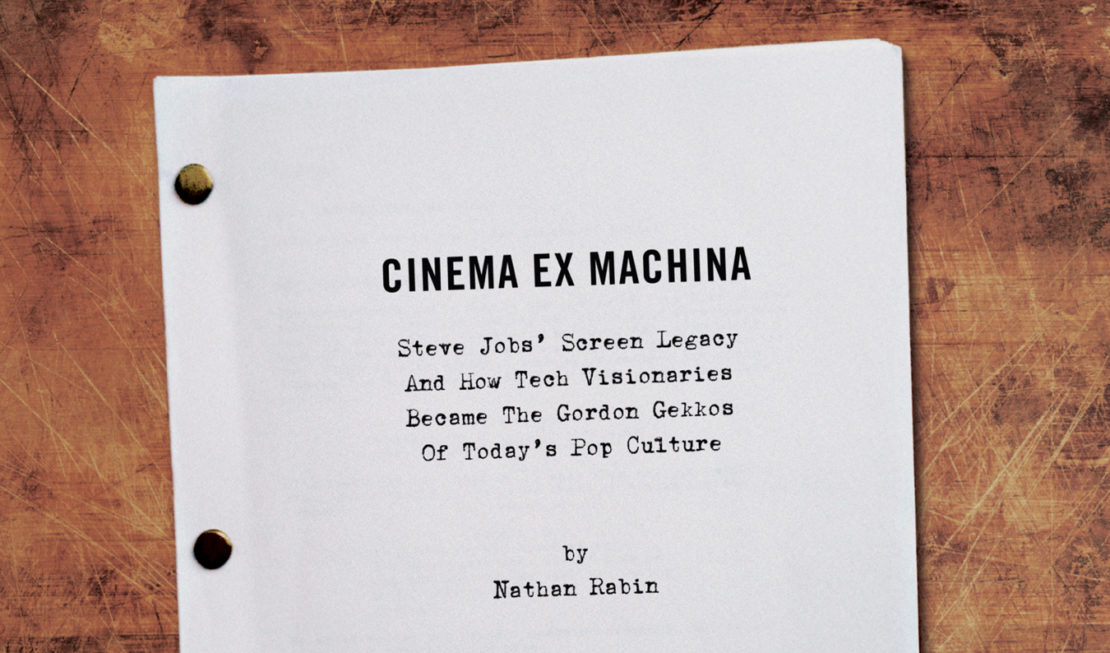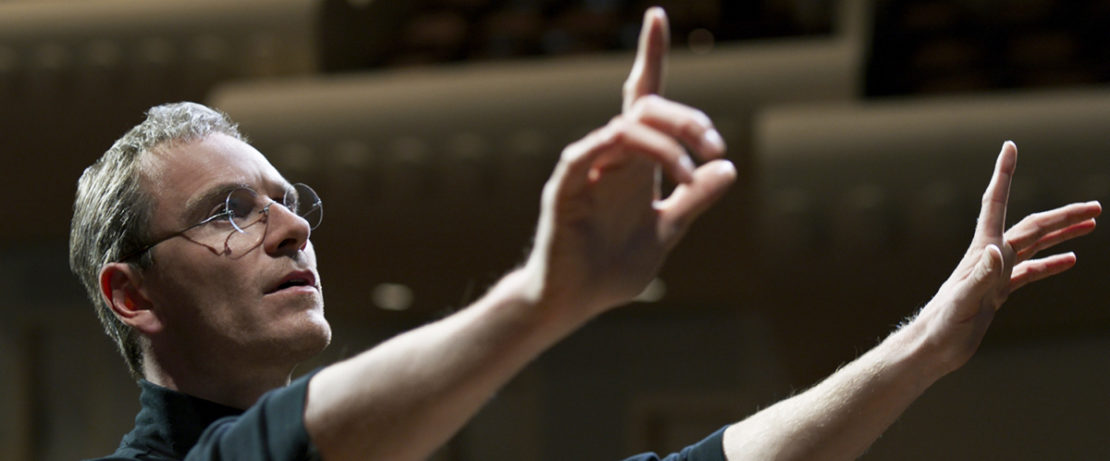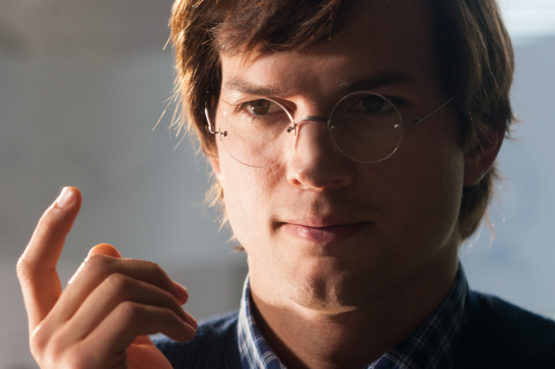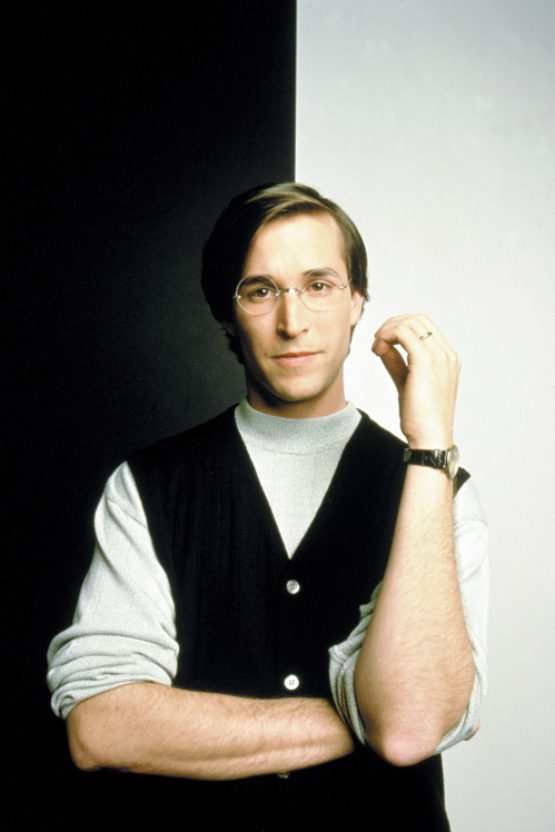
Cinema Ex Machina
As the release of Steve Jobs, the long awaited fourth feature about the Apple kingpin attests, technology billionaires loom large in our culture. They are the architects of our world, innovators whose genius shapes the way we live. It's difficult to overstate the impact someone like Steve Jobs has had on our world. In fact, after watching the entire cinematic sub-genre of movies about him, it could quite easily be argued that even after his death, this still is Steve Jobs' world; he was just condescending enough to let all of us inhabit it.
There have been other films, based on the characters of Bill Gates and Mark Zuckerberg, who also made more than just the "dent in the universe" that Steve Jobs set out to leave behind. What makes these tech tycoons so fascinating to the makers of modern cinema?
In the past, cinematic billionaires made their fortunes in finance, perhaps, or real estate, and lived large, with giant mansions, voluptuous trophy wives and gleaming yachts; and wielded power over politicians and henchmen. But the new breed of tycoon in movies seems to see the work itself as the primary reward. They are larger-than-life figures with a borderline superhuman grasp of technology and innate business savvy, while at the same time being hopelessly lacking in some crucial facet. Often, that shortcoming takes the form of an absence of morality coupled with a curious insight into humanity's deepest desires. There is a sense that they create products that compensate for some deep deficiency in their own characters.
In Ex Machina, writer Alex Garland's directorial debut, billionaire Nathan Bateman's wealth and power seem to exist in inverse proportion to his morality, likeability and social skills; but he has a unique window into the wants and needs of the world by virtue of his status as the man behind the world's most popular search engine.
What are search engines if not giant, fascinating, semi-secret repositories of our fascinations, hopes and embarrassments? Nathan seems devoid of crucial elements of humanity like warmth, empathy, and concern for others; but that all-powerful search engine gives him unique insight into the sum of humanity in all its ugliness and insatiable need.
Nathan is a narcissistic creep who lives solely for his own pleasure and power; he seems incapable of having a functional romantic or sexual relationship with a complicated human being with messy emotions and needs of his or her own. So, he creates a machine more miraculous than anything Steve Jobs ever dreamed of: a sex android who seems to offer the exhilarating pleasure and sensation of actual sex without the complications that arise from being with someone human.
In David Fincher's The Social Network, boy genius Mark Zuckerberg (Jesse Eisenberg), a cranky figure only slightly more comfortable with flesh-and-blood human beings than Nathan Bateman, makes Facebook a cultural institution so that similarly curmudgeonly souls can make 'friends' without resorting to such terrifying and stressful endeavours as talking to other people and making eye contact. Zuckerberg has objected to his portrayal in the film; and according to Noah Wyle, who portrayed Steve Jobs in the 1999 cable TV movie Pirates of Silicon Valley, Jobs also took great issue with what was his first onscreen characterisation. Ironically, Zuckerberg and Jobs' understandable objections to being portrayed as thin-skinned and prickly couldn't help but reaffirm that negative depiction.
The tech billionaire in pop culture is often a sad, solitary and faintly malevolent figure, alienated from the rest of society by the fatal flaws in his personality, as much as by his enormous wealth and power
The non-fiction Steve Jobs was, according to the biographical record, famously abandoned by his birth parents and was absent throughout his daughter Lisa's early life (partly because he was so hard at work on a computer he named Lisa, perversely enough); yet he created a company and a cult of personality that connected the world through technology, through a series of miracle gizmos with different powers and capabilities but with a unified minimalist aesthetic which he controlled.
Indeed, reading Walter Isaacson's epic biography of Jobs, which screenwriter Aaron Sorkin adapted for his biopic, it's easy to get the sense that money didn't particularly matter to Jobs except as a way of keeping score, of establishing in the most concrete possible way that he had succeeded in remaking the world in his image. Jobs had a famously minimalistic aesthetic: he seems like a man who would be just as happy living in a small, elegantly designed little apartment as he would be in a giant mansion.
The tech billionaire in pop culture is often a sad, solitary and faintly malevolent figure, alienated from the rest of society by the fatal flaws in his personality, as much as by his enormous wealth and power. For these complicated, often cold and aloof men, winning, control and power are their own reward; the spoils of victory are nice but largely beside the point. This perception of them as being profoundly different on a psychological as well as financial level is rooted in what we know about Jobs and Gates and Zuckerberg. The tycoons portrayed in Judge's recent HBO TV satire Silicon Valley are certainly informed by the public personas of Gates and Jobs; but also by the people for whom Judge worked early in his career, before moving from computers to entertainment.



Steve Jobs on screen
These new tycoons are not like you and me, but their peculiar combinations of gifts and weaknesses shape the way we communicate, the way we process art and the ways we think about ourselves and our world. Film and television aren't the only media fascinated by them: in recent years, zeitgeist-capturing books like Dave Eggers' The Circle, Ernest Cline's Ready Player One (for which Spielberg is slated to direct the film adaptation), Joshua Cohen's The Book of Numbers and Gary Shteyngart's Super Sad True Love Story have all featured dysfunctional tech giants.
Steve Jobs has, not surprisingly, been the focus of much of this fascination. The size and scope of the four narrative retellings of the Apple guru's life reflect Jobs' cultural ascendancy. The Aaron Sorkin-written and Danny Boyle-directed Steve Jobs, released in the UK next week, nakedly aspires to Oscar-festooned greatness; whereas the first movie to tell the tale of the rivalry between Steve Jobs and Bill Gates was the forgotten 1999 television movie Pirates of Silicon Valley. Though ambitious by the extremely lenient standards of cable TV, Pirates is still, most assuredly, a conventional television movie, with all the shortcomings and limitations inherent to the genre.
Explore
Meet the supercutters A musical afterlife Who is Stan Smith? And why am I wearing his shoes?The film tells its story in the broadest strokes imaginable. All that's missing from the Big Book of Counterculture Clichés is a B-roll montage of long-haired children placing flowers inside the rifles of scowling National Guardsmen while Buffalo Springfield's For What It's Worth grooves on the soundtrack. Jobs comes across as a cartoon hippy who evolves into a brash caricature of an obnoxious, alpha male business titan (the kind of guy who charges into an interview, puts his smelly bare feet on a table and then asks the nerd interviewee about his sex life).
It's the kind of culture history for beginners primer that clumsily seeks to convey the essence of Jobs' early existence as, like, a long-haired, deodorant-averse, Eastern religion-crazed hippy moonchild by having him spin around madly in an LSD-soaked reverie over sepia-toned images of fields moving ecstatically while he giddily enthuses, "Everything's moving with the wind!"
And when Pirates of Silicon Valley wants to illustrate that, despite those cool glasses and hip haircut, Bill Gates was, and remains, something of a Poindexter, it does so by having a clueless Gates ineptly try out John Travolta's Saturday Night Fever moves in a roller disco rink and fall down inelegantly in the process.
Pirates of Silicon Valley: trailer
One of the many reasons Pirates of Silicon Valley feels hopelessly, hilariously off, aside from the fact that it was made just before Apple leaped forward in the noughties, is that it culminates in Jobs' 30th birthday party. A caption then informs the viewer that Jobs would be fired just three months after this bittersweet soiree, followed by the equally damning reveals that Microsoft bought part of Apple, and that Bill Gates is now the richest man in the world. In case the message is too subtle, the movie shows Gates looming over Jobs on a giant screen while the hopelessly life-sized Jobs announces a collaboration between Apple and Microsoft that more than a few saw as conclusive proof that Jobs had lost his maverick mojo.
The implication is clear: in the epic battle between Steve Jobs and Bill Gates, Bill Gates won decisively. Today, Jobs is dead of a disease he might possibly have beaten had he not been too stubborn and proud to accept medical treatment at crucial times; while Gates, still one of the richest people in the world, enjoys a reputation as a service-minded philanthropist renowned for his massive donations to charity and his benevolent treatment of employees. Yet it's hard not to see Jobs as the clear winner. His dramatic early death has freeze-framed him at the height of his extraordinary powers. He will never grow old, he'll never get fired again, and he'll never be seen to fail in his constant efforts to reinvent the world. Today, Jobs towers over us as a combination of secular saint and glamorous celebrity who forever changed the way we live, possibly even for the better (as long as you're not a labourer assembling Apple circuit boards in China); while Gates, for all his wealth, power and philanthropic afterlife, is still just the nerd who owns Microsoft.
In 2013, a group of wisenheimers over at Funny Or Die decided to beat the release of Jobs, the Ashton Kutcher-powered biopic, with a rival film of their own. To achieve this, they wrote their film in three days and filmed it in five (the project's threadbare laziness betrays its hasty origins).
iSteve uses Jobs' life to spoof the conventions of biopics as much as Jobs himself; but the film ends up being far less amusing than Pirates of Silicon Valley, which wasn't intended as a parody at all.
Jobs casts a shadow larger in death than Bill Gates does in life. Where Pirates of Silicon Valley ends with the clear implication that Gates triumphed decisively in their rivalry, Jobs, the Kutcher film, all but writes Gates out of the narrative entirely. Long gone are the days when Jobs had to share a cheesy television movie biopic with his friend-turned-rival. Hell, in Jobs, Microsoft isn't even Apple's main competition; that dubious honour goes to IBM, those stodgy exemplars of old-guard cluelessness.
Jobs opens with Ashton Kutcher introducing the iPod, a development it sees as only a shade less important to civilisation than god first breathing life into Adam's lungs. We then flashback to Jobs' hippy, groovy Reed College days and are treated to yet another delirious acid trip.
The mogul who emerges in Jobs is an arsehole all right, but he's god's own arsehole, a man whose belligerent disregard for the feelings of others is depicted as a small price to pay for his world-enhancing genius. The filmmakers underline that Jobs is different and better than anyone else on a stylistic as well as narrative level. They film him in a perpetual heavenly glow, as if he's forever on the verge of being raptured and called up to heaven for the ultimate promotion – running the universe because he's better qualified to do so than god. Sure, god may have created heaven and earth, but it took Steve Jobs to bring the iPod to life.
In 2015's Steve Jobs, Gates is once again an afterthought rather than a central player. The movie relegates him to a 10-second cameo via an archive clip of the Microsoft billionaire on Late Night with David Letterman. It doesn't even bother to find an actor to play him when it can just license a tiny bit of television footage.
Steve Jobs gives Jobs' life the Social Network/Aaron Sorkin treatment. Instead of trying to tackle the sum of Jobs' life via the cheap, easy shorthand of well-worn clichés (to its credit, there is no acid trip here, and only short flashbacks to his hippy days); it concentrates instead on three central moments in Jobs' life that collectively tell the story of this preeminent architect of our world, and consummate arsehole.
The movie focuses on the launch of the Macintosh, the disastrous launch of NeXT, the company Jobs started after being forced out of Apple, and then finally the launch of the iPod. As befits a movie about the man who gave the world the iPod, Steve Jobs has a muscular, percussive rhythm, a musicality rich in operatic crescendos as men stuck in a complicated web of dependence, resentment, anger and love clash over moments that would forever change the face of American business.
Jobs is now considered a god while Gates remains a good-hearted nerd; but there was a time when the Microsoft titan was seen as a voracious and monopoly-minded businessman, and the hysterical 2001 techno-thriller Antitrust takes this perception of Gates as a sinister omnipresent force within our business and culture to paranoid, unintentionally comic extremes.
In the film, that icon of earnest, tree-hugging liberalism Tim Robbins plays the Gates-like tech superbillionaire Gary Winston, who recruits a brilliant young programmer (played by a wonderfully miscast Ryan Phillippe) into his sinister world of murder, corruption, collusion, and universal surveillance. Winston is smooth and full of guile, the kind of guy who would never fall down on roller skates while trying to dance like John Travolta.
Their different way of thinking gives them a particular genius for technology without giving them an equivalent gift for social skills, separating them from the rest of the world while giving them the drive to make our world an easier, more convenient and pleasurable place to be
Antitrust's over the top portrayal of its Gatesian villain is oddly reassuring in its wild implausibility. In reality, Steve Jobs, with his sleek, slightly sinister good looks, blazing, Rasputin-like intensity and habit of terrorising underlings (both as a core business strategy and as malicious sport), would make for a much more convincing baddie. But at the turn of the century, Gates occupied a very different place in our culture than he does now; and Jobs wasn't yet the object the intense fascination and deification he is today.
The contemporary image of Gates as a nice, harmless old man is reflected in the role a Bill Gates impersonator plays as part of Nathan Fielder's repertory of oddball collaborators on Nathan for You, a sort of guerrilla exercise in comic stunt journalism in the tradition of Da Ali G Show. Part of the humour comes from the glorious awkwardness of the Gates impersonator, who communicates exclusively with lines in which the name Microsoft is liberally dropped, to really drive home that he is impersonating one specific nerd instead of nerds in general. But the rest of the humour resides in the notion that anyone would be in the market for a Bill Gates impersonator in the first place.
Another offbeat American television comedy, Mike Judge's pitch-perfect computer world satire Silicon Valley, boasts not just one tech billionaire but a handful of them, forever jostling for superiority. With the exception of an obnoxious jock obsessed with the "triple comma club" (that being the number of commas that come with being a billionaire), the titans of technology in Silicon Valley run the gamut from clearly autistic to somewhere lower down on the spectrum. For them, like Jobs, winning is about winning, about thrusting your vision of technology on the marketplace above your competitors, as opposed to racking up the spoils of business victory.
Explore
What is common sense? The future according to Wikipedia How are we coping with the failure of our startup?These architects of the modern world embody Apple's famous directive to "think differently" on a neurological as well as a rational level. They do not see the world the same way as people without Asperger syndrome or high-functioning autism do, and this different way of thinking sometimes gives them a particular genius for technology without giving them an equivalent gift for communication or social skills. In that respect, the condition is sometimes a gift, one that simultaneously separates them from the rest of the world, while giving them the skills and drive to make our world an easier, more convenient and pleasurable place to be.
In one of the many moments in Steve Jobs that begs to be excerpted come the Oscars, Michael Fassbender's toxically charismatic Jobs quotes a conductor saying that while his musicians play their instruments, his job, as conductor, is to "play the orchestra". Jobs sees himself in a similar light; it's his job to terrorise, manipulate and control his Apple and Pixar employees into realising his minimalist symphony of technological perfection. Few filmmakers are as shameless or skilled at manipulating audiences as Boyle and Sorkin, but the disappointing box-office gross of Steve Jobs in the US suggests that audiences are tired of hearing this tune, no matter how masterfully it's played, and that it might be time to retire this epic tale; or, at the very least, give it a long rest.
In no small part because he was something of a raging arsehole, Jobs has consistently proven to be an unpopular cinematic subject, stuck uncomfortably between hero, antihero and villain. But given that the man himself was down plenty of times in his life, and always came back, it may be unwise to underestimate him in any context. It's entirely possible he'll make a posthumous comeback as a figure of cinematic fascination, particularly if the movie ends up getting those longed-for Oscar nominations. Even in death, it would be foolish to count Jobs out.